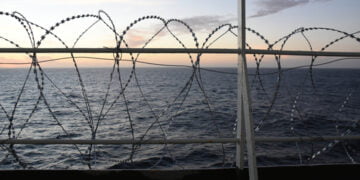Höegh Autoliners and Nordic Circles have launched a project to transform how decommissioned ships are handled.
On 3 June, Nordic Circles and Höegh Autoliners announced an agreement during the Blue Talks stage at Nor-Shipping, launching a project that establishes a circular value chain for decommissioned ships.
Under the initiative, retired vessels will be upcycled in Norway, using domestic technology, labor and industry, into certified building materials, without melting or export and with emissions reduced by up to 97%.
The agreement includes up to eight ships from Höegh Autoliners, with the first upcycling set for completion in 2026. These ships alone have the potential to cut carbon emissions in the construction industry by 100,000 tons of CO₂.
We aim to be the greenest in deep-sea shipping and have set a net-zero target by 2040. That’s why we’re building the world’s largest and most environmentally friendly car carriers and investing in making green ammonia a viable fuel already from 2027.
…said Sebjørn Dahl, COO, Höegh Autoliners.
The agreement is worth NOK 1.3 billion (around 113M euros) and the first vessel is scheduled for decommissioning at AF Offshore Decom in Vats.
As stated, Norway has the fifth largest merchant fleet by value, and when combined with the EU’s share, the market potential extends to 45% of the world’s merchant fleet. With new climate regulations and an aging global fleet, ship decommissioning is expected to double in the coming years.
Along Norway’s coast, seven EU-approved shipyards have been developed to handle this demand, including AF Offshore Decom in Vats, recognized as the world’s most environmentally friendly decommissioning facility.
These yards have additional capacity and some can accommodate large vessels. The recent agreement marks an important first step in building Norway’s capacity to upcycle ships and create a new green industry for both Norway and Europe.
Furthermore, globally, the construction industry accounts for 40% of greenhouse gas emissions, with steel being one of the largest contributors. That’s why the core of the project is simple: Steel should not be exported and melted down – it should be reused in Norway and Europe.
This is circular economy at its best – managing to build a sustainable industry from what we used to export as hazardous waste to Asia. The eight ships will save society around 100,000 tons of CO2 and pave the way for mobilizing shipyards and shipping companies across Europe
…said John Jacobsen, CEO of Nordic Circles and Oppsirk.
Supported by Norway’s Green Platform initiative, the project is led by Nordic Circles and includes a consortium of major stakeholders, such as AF Offshore Decom which is the main contractor, Statsbygg, Oslo and Bergen municipalities, Skanska, Green Yard, Equinor, DNB and SINTEF.
































































